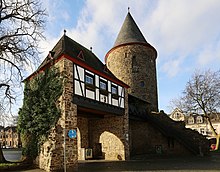|
Rheinbach
Rheinbach is a town in the Rhein-Sieg-Kreis district (Landkreis), in North Rhine-Westphalia, Germany. It belongs to the administrative district (Regierungsbezirk) of Cologne. GeographySituated 15 km (9 mi) south-west of Bonn and 35 km (22 mi) south of Cologne, Rheinbach lies at the edge of the Eifel region and within the borders of Rhineland's nature reserve. HistoryAround 80 AD, the Eifel Aqueduct, one of the longest aqueducts of the Roman Empire, was running through what is today Rheinbach's town centre.[3] The first written documentation of Rheinbach dates back to 762, when Pepin the Short, then King of the Franks, gave lands to the Prüm Abbey.[4] In the early 17th century, Rheinbach came to prominence because of its witch-hunts.[5] First referred to as a town in 1298, the Archbishop of Cologne purchased Rheinbach and the surrounding villages in 1343. Till 1789, Rheinbach was part of the Electorate of Cologne. In 1794, Rheinbach was incorporated into France within the Département de Rhin-et-Moselle before coming under the auspices of Prussia in 1815. Around 1947, a considerable number of displaced people from the Sudetenland settled in Rheinbach. Having brought their traditions of glasscraft, Rheinbach became famous for its glass art and today hosts a glass art museum and a specialized school. Coat of armsThe coat of arms was made official in 1915 by Wilhelm II, German Emperor and King of Prussia. The black cross with the silver background stands for the Roman catholic archdiocese of Cologne. The Eagle stems from the coat of arms from the Counts of Are-Hochstaden. The blue key refers to the Holy Saint Peter, the patron saint of the Archdiocese of Cologne.[6] Governance
Besides the town proper, Rheinbach administratively comprises the surrounding villages and hamlets, including Flerzheim. As of 2016, the town council has a Christian Democratic (CDU) majority with 17 seats; the Social Democrats (SPD) hold 10 seats, while the Greens (Die Grünen), the Independents (UWG) and the Liberals (FDP) hold three each. EducationA local hub for education, Rheinbach is the seat of the Hochschule Bonn-Rhein-Sieg, a university of applied science which specializes in business and biomedical sciences. There are three secondary schools in Rheinbach. The municipal Gymnasium was founded in 1852 and is one of the oldest public secondary schools in the Bonn region; the Vinzenz-Pallotti-Kolleg was one of the few boarding and private schools in Germany; the Catholic run St.-Joseph-Gymnasium was historically a girls-only school and is now coeducational. TransportRheinbach lies in proximity to the Bundesautobahn 61 which connects it with Cologne. The S-Bahn RB23 (Voreifel Railway) connects Rheinbach with Bad Münstereifel and Bonn. Rheinbach is part of the regional bus network of Cologne (Regionalverkehr Köln). Twin towns – sister cities
Rheinbach and the similarly named town of Rhinebeck, New York, USA, participate in a student exchange program.[8] Notable people
References
External links
|
||||||||||||||||||||||||||||||||||||||||||||||||||||||







